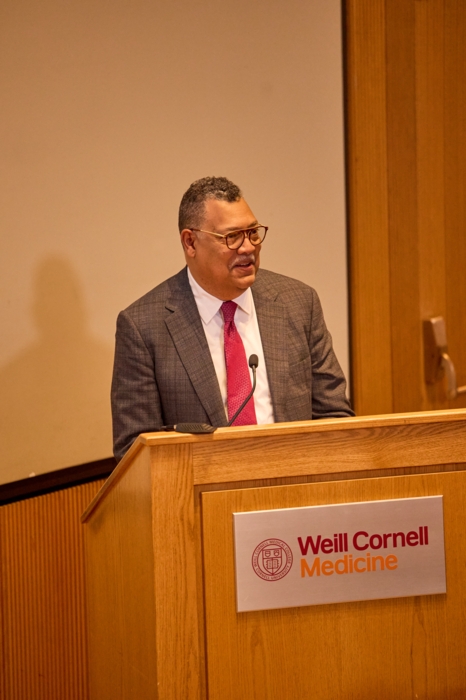Diversity is a tool for truth, not political agendas, said Vincent D. Rougeau, president of the College of the Holy Cross, in his keynote address April 7 for Weill Cornell Medicine’s seventh annual Diversity Week.
Rougeau delivered the Elizabeth A. Wilson-Anstey, EdD Lecture, “Why Commitment to Diversity Still Matters,” in Uris Auditorium as part of the annual celebration of Weill Cornell Medicine’s commitment to greater equity, diversity and inclusion in academic medicine and health care.
“We’re living in a moment in which it feels rather fraught to acknowledge the things that we know are true,” said Rougeau, a lawyer who in 2021 became the first Black president of Holy Cross, the nation’s only undergraduate Jesuit liberal arts college. “I see diversity as a reality check. It’s engaging the world as it is. Acknowledging its importance allows us to solve real problems.”
In his deeply personal speech, Rougeau drew from his family’s civil rights history and experience as a legal scholar to reinforce the concept that diversity is about understanding people, not just representation. Indeed, diversity is essential for effective health care, education and leadership, he said, because it ensures we understand and care for people as they truly are, not as abstractions.
“When we think about why diversity matters, it is this notion that no two people are the same, whether they are stepping onto a college campus in my world or into a doctor’s office in yours,” said Rougeau, who previously served as dean of Boston College Law School and the inaugural director of the Boston College Forum on Racial Justice in America.
To drive home how systemic inequities must not be ignored, Rougeau spotlighted shocking disparities in the average lifespans among residents of two neighborhoods in Boston—Back Bay and Roxbury—that are separated by mere blocks. In 2023, a study by the Boston Public Health Commission found that people living in Back Bay had an average life expectancy of 92, while those in Roxbury were expected to live until only 69. The two neighborhoods are composed of people of different races and vastly different socioeconomic status.

Holy Cross President Vincent Rougeau as he delivers the Elizabeth A. Wilson-Anstey, EdD Lecture, “Why Commitment to Diversity Still Matters,” April 7 in Uris Auditorium.
“We would all agree that a child from Roxbury deserves the same opportunity to have a long and healthy life as their neighbors in Back Bay,” he said. “But how would we determine or implement any solutions without acknowledging the difference between the two? This is why a commitment to diversity is critical to our work.”
Prior to his role at Boston College, Rougeau was a professor of law at Notre Dame Law School and served as its associate dean for Academic Affairs. A graduate of Brown University and Harvard Law School, Rougeau has written extensively on law and religion and is a nationally respected expert on legal education and Catholic social thought.
Despite “all the court decisions and legal challenges swirling around us” in recent years, the law has not suggested diversity is wrong, Rougeau noted. In U.S. Supreme Court Chief Justice John Roberts’ opinion in the 2023 decision reversing affirmative action, Roberts wrote that Harvard University’s goals tied to creating a more diverse university were “commendable.”
But “we don’t need the law to tell us that this is a commendable goal,” Rougeau said. “Our lived experience in the work we do makes it clear that this is so.”
“Let’s bring people together,” he added. “Let’s open doors to opportunity. Let’s support each person we interact with to become the best version of themselves. Let’s create communities rooted in justice and belonging.”
Dr. Robert A. Harrington, the Stephen and Suzanne Weiss Dean of Weill Cornell Medicine and provost for medical affairs of Cornell University, who earned his undergraduate degree from Holy Cross, told the audience that his education there had intricately shaped his view of social justice and caring for the world’s most vulnerable people. Those early lessons are helping reinforce Dr. Harrington’s leadership approach in the face of the new presidential administration, he said.
“Maybe one of the things that struck me most by living with the Jesuits for those four years is their notion of not just that we’re here to serve our community, but we’re here to serve the global community,” he said. “I believe that we’re here to let free inquiry reign.”

